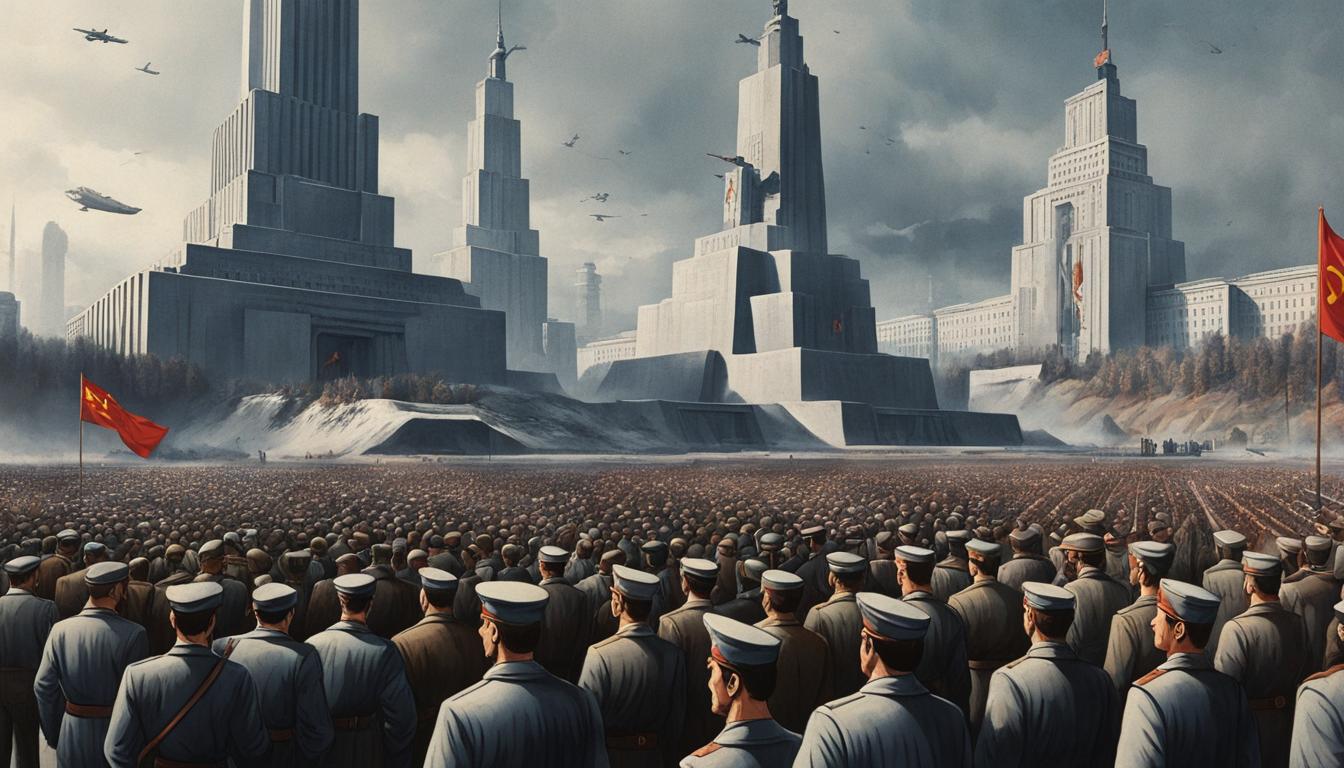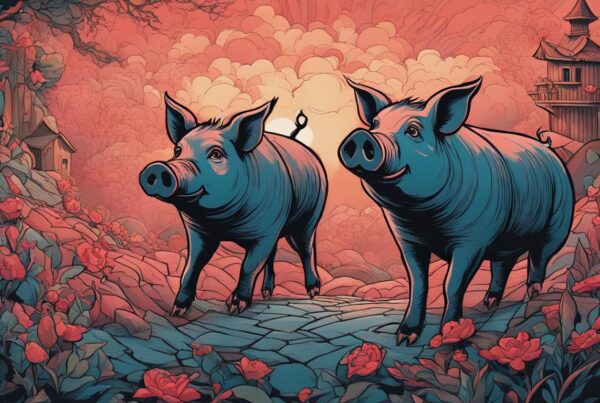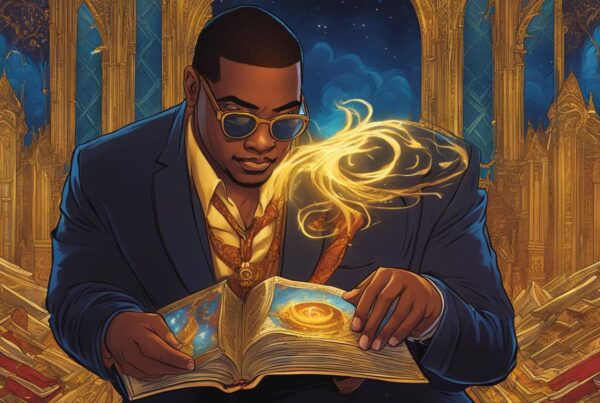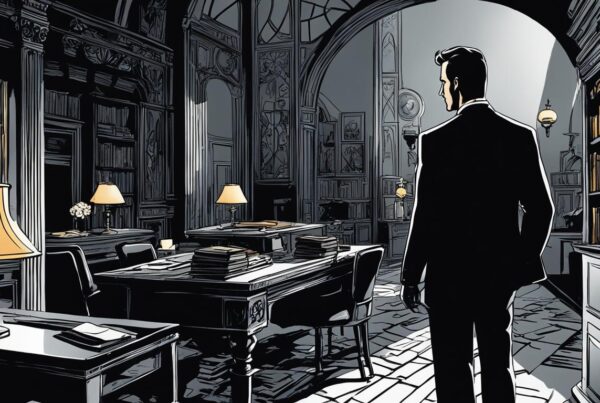The Best Alternate History Stories of the 20th Century is an anthology that takes readers on an imaginative journey through captivating tales of alternate history. Edited by renowned author Harry Turtledove, this anthology brings together fourteen compelling stories that explore intriguing “what if” scenarios and offer thought-provoking insights into pivotal moments in history.
Within the pages of this anthology, readers will encounter a diverse collection of stories written by esteemed authors such as Kim Stanley Robinson, Nicholas A. DiChario, Harry Turtledove, and Larry Niven. Each story offers a unique take on alternate history, secret history, and science fiction, providing readers with a rich tapestry of imaginative narratives to explore.
Whether you’re a fan of alternate history or simply love a good story, The Best Alternate History Stories of the 20th Century is sure to captivate and entertain. Join us as we delve into these fascinating tales that challenge our perceptions of the past and offer new possibilities for the future.
Key Takeaways:
- Explore the captivating world of alternate history through this anthology edited by Harry Turtledove.
- Discover fourteen thought-provoking stories written by acclaimed authors.
- Delve into “what if” scenarios and gain new insights into pivotal moments in history.
- Immerse yourself in imaginative narratives that blend alternate history, secret history, and science fiction.
- Experience a captivating journey through alternate worlds and historical what-ifs.
“The Lucky Strike” by Kim Stanley Robinson
“The Lucky Strike” is a captivating story in the anthology written by renowned author Kim Stanley Robinson. This thought-provoking tale combines the elements of alternate history and time travel to create a unique narrative experience. The protagonist, January, is a bombardier from the 1980s who finds himself in the midst of World War II.
However, this is not just any ordinary war story. January faces a moral dilemma as he drops a bomb during the war, fully aware of the devastating consequences it will unleash. The story delves deep into the moral implications of his actions and presents a sense of moral outrage that captivates readers.
“The Lucky Strike” stands as a testament to Kim Stanley Robinson’s ability to explore complex themes and engage readers in profound discussions. With its exploration of alternate history and the ultimate question of personal responsibility, this story leaves a powerful impact.”
Kim Stanley Robinson’s masterful storytelling blends history and speculative fiction, creating a captivating narrative that will leave readers contemplating the intricate web of morality and the consequences of our actions.
The Lucky Strike Table of Contents:
| Chapter | Title |
|---|---|
| 1 | Introduction |
| 2 | Setting the Stage: Historical Context |
| 3 | The Protagonist’s Dilemma: January’s Moral Quandary |
| 4 | Exploring Alternate History: Time Travel and Consequences |
| 5 | Reflecting Moral Outrage: The Impact on Readers |
The Lucky Strike” by Kim Stanley Robinson challenges readers to consider the weight of their choices and the moral outrage that arises from navigating complex ethical dilemmas. It is a testament to the power of storytelling and the impact fiction can have on our perception of history.
“The Winterberry” by Nicholas A. DiChario
In “The Winterberry”, an engaging story by Nicholas A. DiChario, readers are drawn into a puzzle game-like adventure through alternate histories. This thought-provoking tale invites readers to unravel the key elements of the story, delving into the intricacies of different paths that history could have taken. Unlike traditional puzzle games, “The Winterberry” offers more than just a mental challenge; it also captivates with its compelling narrative quality.
The author skillfully balances the puzzle game aspect with seamless storytelling, creating an immersive reading experience for fans of alternate histories. While the puzzle intrigues readers, it does not overshadow the richness of the narrative itself. Through vivid descriptions and well-developed characters, DiChario navigates the complex web of alternate possibilities, bringing to life fascinating worlds and situations.
“The Winterberry” effortlessly captures the essence of alternate history storytelling, combining puzzle game elements with a captivating narrative that keeps readers enthralled till the very end.
With “The Winterberry”, Nicholas A. DiChario showcases his prowess in crafting alternate histories that spark imagination and intellectual curiosity. This gripping tale leaves readers contemplating the myriad paths history could have taken, inviting them to unravel the mysteries hidden within.
“Islands in the Sea” by Harry Turtledove
In the anthology, “The Best Alternate History Stories of the 20th Century,” Harry Turtledove presents the thought-provoking story, “Islands in the Sea.” This captivating tale delves into the realms of alternate history, exploring a pivotal moment where Arab armies successfully conquer Constantinople. The narrative revolves around a Bulgar king who is faced with a momentous decision – whether to convert to Christianity or retain his faith.
The story delves deep into the political and religious implications of this alternate history. It highlights the complex dynamics between different cultures and their impact on the course of history. Through vivid storytelling and nuanced character development, Turtledove masterfully portrays the tensions, dilemmas, and consequences faced by the Bulgar king.
“Islands in the Sea” offers a compelling exploration of the collision between empires, religions, and personal beliefs. Turtledove’s ability to intricately weave historical events with alternate outcomes brings forth a narrative that is both engaging and thought-provoking.”
Key Themes in “Islands in the Sea”:
- Political maneuvering and diplomacy in the face of conquest
- Religious conflicts and the weight of personal beliefs
- The impact of historical events on individual lives
Through “Islands in the Sea,” Turtledove invites readers to explore the intricacies of alternate history and contemplate the significance of each decision made by historical figures. This engaging narrative prompts thought and discussion, leaving readers with a deeper understanding of the complexities of the past and its potential impact on the present.
| Pros | Cons |
|---|---|
| The story provides a unique perspective on a pivotal historical event. | The narrative may require some background knowledge of historical events |
| The exploration of religious and cultural conflicts is thought-provoking. | The pacing of the story may feel slow for some readers. |
| Turtledove’s writing style is immersive and engaging. | The story may not appeal to readers who prefer action-packed plots. |

Discover More Alternate History Gems in “The Best Alternate History Stories of the 20th Century”
Don’t miss the opportunity to explore other captivating alternate history stories in “The Best Alternate History Stories of the 20th Century” anthology. From the moral complexities of “The Lucky Strike” by Kim Stanley Robinson to the utopian visions of “Eutopia” by Poul Anderson, this anthology offers a diverse collection of enthralling tales that will transport readers through the corridors of alternate worlds and historical possibilities.
“Suppose They Gave A Peace” by Susan Swartz
“Suppose They Gave A Peace” by Susan Swartz is a captivating story that transports readers to an alternate history where the outcome of the 1972 election takes a dramatic turn. In this alternate reality, Senator George McGovern emerges victorious and immediately withdraws from the Vietnam War, sparking an anti-war wave that resonates throughout the nation.
The consequences of McGovern’s decision unfold in Swartz’s thought-provoking narrative, highlighting the disillusionment experienced by an entire generation. The story delves into the societal, political, and personal ramifications of this alternate history, exploring the complex emotions and lasting impact it has on the characters.
The stark contrast of this alternate timeline against the actual historical events creates a compelling backdrop for Swartz’s exploration of the human condition. Through intricate storytelling and rich character development, “Suppose They Gave A Peace” examines the interplay between personal choices, political movements, and the ripple effects they have on society.
“Swartz masterfully delves into the depths of individuals navigating the aftermath of a divisive conflict, immersing us in the tangled web of emotions and consequences. Her ability to intertwine personal narratives with historical events paints a vivid picture of an alternative world that feels hauntingly real.” – Literary Critic
With “Suppose They Gave A Peace,” Susan Swartz adds a unique perspective to the anthology, offering readers a thought-provoking exploration of alternate history and the transformative power of peace. This absorbing story embodies the power of storytelling to challenge our preconceptions, provoke introspection, and shed light on the complexities of our shared history.
Stay tuned for further captivating tales in the anthology, as we delve into more profound and mind-bending alternate history stories.
“All the Myriad Ways” by Larry Niven
“All the Myriad Ways” is a captivating story written by Larry Niven included in the collection. Combining the elements of alternate history and science fiction, this tale takes readers on a mind-bending journey through parallel universes.
Niven expertly explores the concept of different possibilities and choices in these alternate worlds, challenging conventional narratives. The story draws readers in with its intricate plot and imaginative settings, leaving them questioning the boundaries of reality.
What sets “All the Myriad Ways” apart is its counter-intuitive ending. Niven defies expectations and deviates from typical character motivations, presenting a conclusion that will leave readers pondering the consequences and intricacies of choice.
This thought-provoking story showcases Niven’s mastery of storytelling and his ability to craft narratives that push the boundaries of imagination. Whether you’re a fan of alternate history or simply love exploring the what-ifs of the universe, “All the Myriad Ways” is a must-read.
“Through Road No Whither” by Greg Bear
“Through Road No Whither” is a captivating story by Greg Bear featured in the anthology. In this alternate history tale, the author presents a unique concept—an enigmatic road that leads to nowhere. As readers delve into this thought-provoking narrative, they are bound to embark on a journey through philosophical themes and introspection.
“Manassas, Again” by Gregory Benford
“Manassas, Again” is a captivating alternate history story written by Gregory Benford and featured in the anthology. This thought-provoking tale explores a fascinating twist on the Civil War, where the historic Battle of Manassas occurs once more. As the characters navigate this altered reality, the consequences of this recurring event unravel before them.
“The echoes of the past reverberate in ‘Manassas, Again.’ Benford skillfully demonstrates the ripple effects of historical repetition, delving into the intricate web of cause and effect in alternate realities. This intriguing exploration of the Civil War adds a new layer of depth to the genre of alternate history.”
– Gregory Benford
Through Benford’s masterful storytelling, readers are transported into a world where familiar events take an unexpected turn. The recurring Battle of Manassas serves as the backdrop for examining the profound impact of historical moments on individuals and society. As the story unfolds, the characters grapple with their roles in shaping the course of history, blurring the lines between the past and the present.
Immerse yourself in the vividly depicted alternate reality of “Manassas, Again,” where the echoes of the past resound and challenge our understanding of the consequences of historical events. Benford weaves a narrative that captivates and invites contemplation, offering a fresh perspective on the Civil War and the power of historical repetition.
“Dance Band on the Titanic” by Jack L. Chalker
“Dance Band on the Titanic” is a captivating story by Jack L. Chalker that takes readers on a unique journey through alternate history and the iconic Titanic disaster. In this engaging tale, Chalker presents a twist in time that averts the tragic sinking of the Titanic. This alternate history concept allows readers to imagine a world where this historical event never occurred.
The story unravels the implications of this altered timeline, exploring how the lives of the characters onboard the Titanic are forever changed. By avoiding the tragedy, Chalker examines the far-reaching consequences of this significant event never taking place, delving into the complex web of relationships, hopes, and dreams that intertwine on the grand ocean liner.
Through vivid storytelling and meticulous attention to detail, Chalker paints a captivating picture of the alternate reality where the Titanic remains afloat. Readers are immersed in a world of possibilities, where the fates of the passengers and crew members are forever altered. The story invites readers to reflect on the power of historical events and the ripple effects they create.
Chalker’s “Dance Band on the Titanic” offers a new perspective on one of history’s most infamous disasters, prompting readers to question the role of fate and chance in shaping the course of human events. The alternate history setting presents a compelling framework for exploring the intricate connections between individuals and the historical events that surround them.
By altering the course of one of the most recognizable moments in history, Chalker weaves an intricate tapestry that challenges our understanding of the past and the possibilities of the future. Through the lens of alternate history, “Dance Band on the Titanic” invites readers to reconsider the narratives we construct around historical events and the profound impact they have on our lives.
“Bring the Jubilee” by Ward Moore
“Bring the Jubilee” by Ward Moore is a captivating story featured in the anthology. Set in an alternate history where the Confederacy emerges victorious in the American Civil War, this thought-provoking narrative explores the far-reaching consequences of this pivotal event. Moore skillfully examines the impact of Confederate victory on society, offering readers a glimpse into a world shaped by a different outcome.
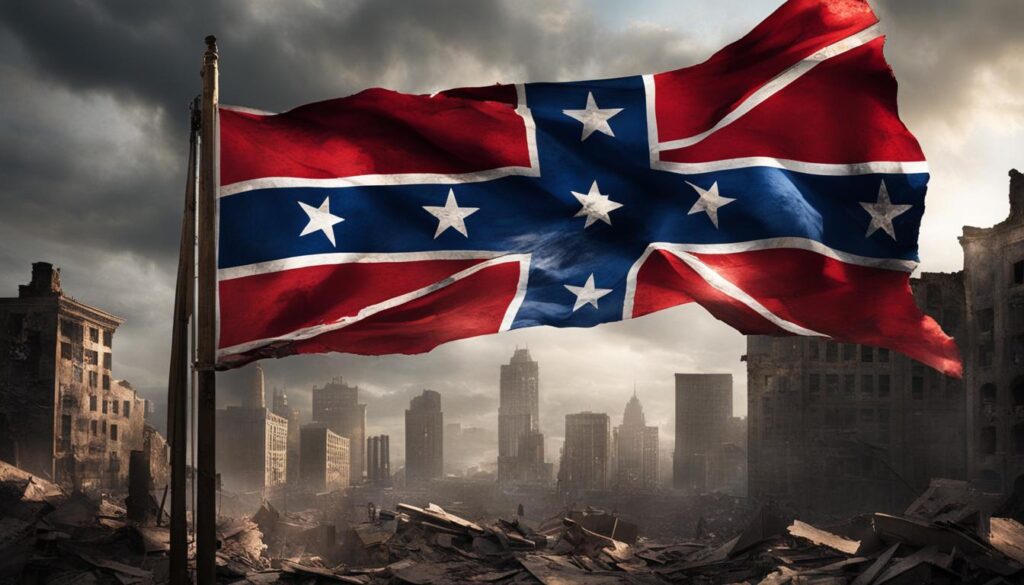
Within the pages of “Bring the Jubilee,” Moore masterfully crafts a tale that challenges our understanding of history and prompts us to ponder the complex interplay between past, present, and future. The story sheds light on the repercussions of a Confederate triumph, unveiling societal shifts, political dynamics, and the struggles of individuals caught in the wake of this altered historical trajectory.
“Bring the Jubilee” is a deeply evocative exploration of an alternate America, where the consequences of the Civil War’s outcome reverberate through time. Moore’s vivid storytelling allows us to contemplate the fragile nature of historical events and contemplate the profound impact they have on our lives.”
As readers delve into “Bring the Jubilee,” they will find themselves captivated by Moore’s richly imagined world and deeply invested in the lives of the characters who navigate its complexities. This alternate history tale serves as a powerful reminder of the enduring influence historical events can wield on the fabric of society and the steadfast resilience of the human spirit.
Key Themes Explored in “Bring the Jubilee”
| Themes | Description |
|---|---|
| The Confederate Victory | Examines the consequences and societal changes resulting from the Confederacy winning the American Civil War |
| Altered Historical Trajectory | Explores the effects of a different historical outcome on individuals, politics, and society |
| Reflection on Historical Events | Prompts readers to contemplate the significance and far-reaching implications of key moments in history |
| Human Resilience | Illustrates the enduring strength and adaptability of individuals navigating a changed world |
“Eutopia” by Poul Anderson
“Eutopia” by Poul Anderson is a captivating story that takes readers on an exploration of an alternate history. In this alternate world, the existence of a utopian society called Eutopia brings forth intriguing ideas about what a perfect society could be like. Anderson skillfully delves into the concept of Eutopia and its implications, presenting readers with a thought-provoking narrative that challenges conventional notions of societal structures.
The story of “Eutopia” offers a glimpse into a different reality, one where harmony, equality, and progress flourish. Anderson’s meticulous storytelling invites readers to reflect upon their own society and question the flaws and limitations that hinder the attainment of a utopian ideal. By presenting an alternate history where such a society is conceivable, “Eutopia” prompts contemplation about the possibilities and potential paths that lie ahead.
| Key Themes | Implications |
|---|---|
| Utopian Society | Explores the concept of a perfect society and its impact |
| Alternative History | Offers a fresh perspective by presenting an alternate reality |
| Ideals and Flaws | Challenges readers to question the limitations of their own society |
Anderson’s “Eutopia” is a testament to his ability to craft compelling narratives within the realm of alternate history. By immersing readers in a world that diverges from our own, he provides a captivating exploration of what the notion of a utopian society entails. This thought-provoking story not only captivates readers but also serves as a catalyst for introspection and contemplation of the possibilities that lie beyond the confines of our present reality.
Conclusion
The Best Alternate History Stories of the 20th Century is a captivating anthology edited by Harry Turtledove. This anthology offers a diverse range of alternate history stories, making it a must-read for fans of the genre. Each story explores different pivotal moments in history, providing readers with intriguing possibilities and thought-provoking narratives.
From the morally-challenging “The Lucky Strike” by Kim Stanley Robinson to the imaginative “Eutopia” by Poul Anderson, this anthology delivers a compelling journey through alternate worlds and historical what-ifs. The anthology showcases the talents of acclaimed authors, including Larry Niven, Nicholas A. DiChario, and Susan Swartz, adding depth and variety to the collection.
Whether you’re a die-hard fan of alternate history or simply love a good story, this anthology combines historical events and speculative fiction to create an engaging reading experience. Harry Turtledove’s expertise as an editor ensures that each story within this anthology is carefully curated and thoughtfully constructed. It is a true treasure trove for those interested in exploring the twists and turns of alternate history.
